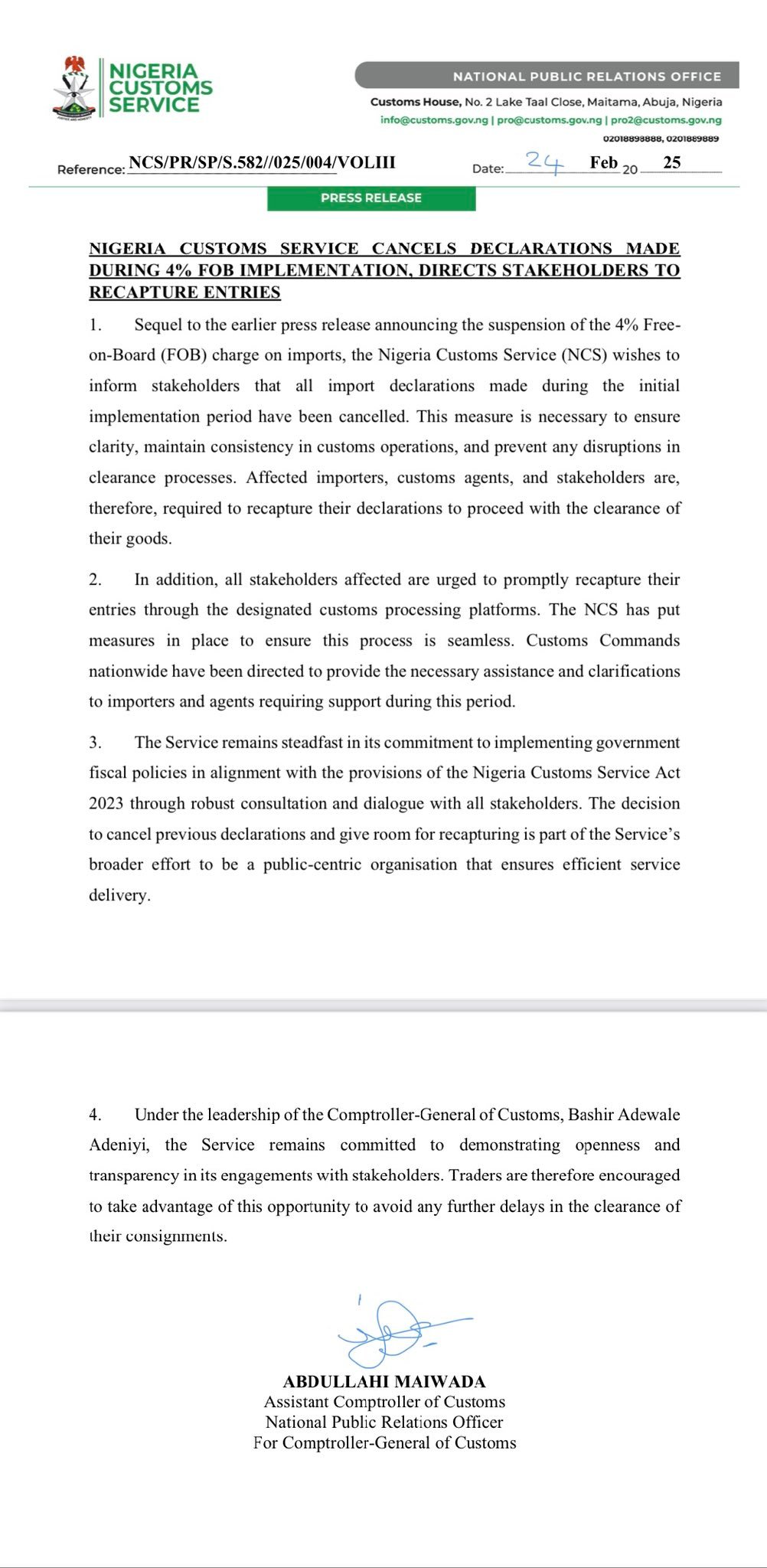The recent developments surrounding the Nigeria Customs Service (NCS) and its handling of the 4% Free-on-Board (FOB) charge on imports have significant implications for importers, stakeholders, and the broader Nigerian economy. This note provides a comprehensive examination of the issue, tracing its evolution from introduction to suspension and the subsequent cancellation of import declarations, as highlighted in an X post by NCS on February 24, 2025 (NCS X post).

Introduction and Purpose of the 4% FOB Charge
On February 6, 2025, the NCS announced the implementation of a 4% charge on the FOB value of all imports, aligning with Section 18(1) of the Nigeria Customs Service Act (NCSA) 2023. The FOB charge, calculated based on the value of imported goods including transportation costs up to the port of loading, was intended to enhance the operational efficiency of the NCS. This move was part of broader efforts to fund customs operations and ensure compliance with legal provisions.
Stakeholder Opposition and Suspension
The introduction of the charge faced immediate backlash from stakeholders, including importers, manufacturers, and economic analysts. Critics, such as Dr. Chinyere Almona of the Lagos Chamber of Commerce and Industry, argued that it would exacerbate Nigeria’s inflation rate and increase the cost of goods, potentially harming economic competitiveness. The implementation was also criticized for lacking due consultation, as required by the NCSA 2023. This opposition led to the NCS suspending the charge on February 12, 2025, following consultations with the Minister of Finance, Mr. Olawale Edun, and other stakeholders. The suspension aimed to facilitate comprehensive engagement and review the Act’s implementation framework, as reported by Voice of Nigeria and Punch Newspaper.
Cancellation of Declarations and Recapturing Process
On February 24, 2025, the NCS issued a press release, as shared in the aforementioned X post, announcing the cancellation of all import declarations made during the period when the 4% FOB charge was in effect. Importers, customs agents, and stakeholders were directed to “recapture” their declarations to proceed with clearing their goods. This measure was described as necessary to ensure clarity, maintain consistency in customs operations, and prevent disruptions. The press release, signed by Assistant Comptroller of Customs Abdullahi Maiwada, emphasized the NCS’s commitment to transparency and efficient service delivery under the leadership of Comptroller-General Bashir Adewale Adeniyi.
The term “recapture” likely refers to resubmitting import declarations without the 4% FOB charge, given its suspension. However, the process and its implications for importers remain somewhat ambiguous. For instance, it is unclear whether importers who paid the 4% charge during the initial declaration period will receive refunds or need to make new payments adjusted for the absence of the charge. The NCS’s import duty payment process, as outlined on their website (NCS Import Duty Payment), indicates that payments are typically made through designated banks upon assessment, suggesting that any prior payments might be subject to adjustment or refund. Yet, the press release does not explicitly address this, potentially leaving importers in a state of uncertainty.
Implications for Importers and the Economy
The cancellation of declarations and the requirement to recapture entries could have several implications. For importers, the process may involve additional administrative effort and potential delays in clearing goods, especially if prior payments need to be reconciled. The lack of clarity on refunds could also lead to financial strain, particularly for small and medium-sized enterprises reliant on timely imports. Economically, the suspension and cancellation are likely to prevent an increase in import costs, which could have been passed on to consumers, thereby mitigating inflationary pressures. This aligns with stakeholder concerns raised during the opposition phase, as noted in Daily Trust.
The NCS’s decision to engage in further consultations, as mentioned in the suspension announcement, suggests a move toward a more inclusive policy-making process. This could lead to a revised framework that balances the service’s funding needs with the economic realities faced by importers. However, the timing of these changes, coinciding with the exit of contracts with service providers like Webb Fontaine, previously funded through the 1% Comprehensive Import Supervision Scheme, adds another layer of complexity, as highlighted in Ships & Ports.
Conclusion
The NCS’s handling of the 4% FOB charge, from its introduction to suspension and cancellation of declarations, reflects a responsive approach to stakeholder feedback. However, the lack of explicit guidance on refunds and the administrative burden of recapturing entries pose challenges for importers. As the NCS continues its consultations, it is crucial for clear communication and support mechanisms to be established to ensure smooth operations and economic stability. This situation underscores the importance of balancing fiscal policy with trade facilitation, particularly in a context where import costs significantly impact consumer prices and economic competitiveness.

